
"I'll Be There" is the first single released from Third Album by The Jackson 5. It was written by Berry Gordy, Hal Davis, Bob West, and Willie Hutch.

"Ain't Nothing Like the Real Thing" is a 1968 single released by American R&B/soul duo Marvin Gaye and Tammi Terrell, on the Tamla label in 1968. The B-side of the single is "Little Ole Boy, Little Ole Girl" from the duo's United LP. The first release off the duo's second album: You're All I Need, the song—written and produced by regular Gaye/Terrell collaborators Ashford & Simpson—became a hit within weeks of release eventually peaking at number eight on the US Billboard Hot 100 and number one on the Hot Soul Singles chart, the first of the duo's two number-one R&B hits. In the UK "Ain't Nothing Like the Real Thing" reached number 34.

"Never Can Say Goodbye" is a song written by Clifton Davis and originally recorded by the Jackson 5. The song was originally written and intended for the Supremes; however, Motown decided it would be better for the Jackson 5. It was the first single released from the group's 1971 album Maybe Tomorrow, and was one of the group's most successful records. It has been covered numerous times, most notably in 1974 by Gloria Gaynor and in 1987 by British pop group the Communards.
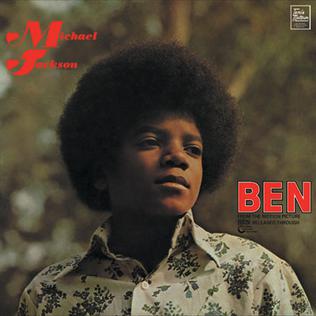
Ben is the second studio album by the American singer Michael Jackson, released by Motown Records on August 4, 1972, while Jackson was still a member of the Jackson 5. It received mixed reviews from contemporary music critics. Ben, however, was more successful on the music charts than Jackson's previous studio album, peaking within the top 10 on the Billboard 200 in the United States. Internationally, the album was less successful, peaking at number 12 in Canada, while charting within the top 200 positions in Australia and France.
"Too Young" is a popular song, with music written by Sidney Lippman and lyrics by Sylvia Dee. A recording of the song was released by Nat King Cole in 1951, which reached No. 1 in the United States and became the best-selling song of the year. The song was an early attempt by music labels to appeal to the younger demographics and its success later led to a boom of music that caters to the young. Another successful version was released by Donny Osmond in 1972.

"Ooo Baby Baby" is a song written by Smokey Robinson and Pete Moore. It was a 1965 hit single by The Miracles for the Tamla (Motown) label.

"Love Is Here and Now You're Gone" is a 1967 song recorded by the Supremes for the Motown label.
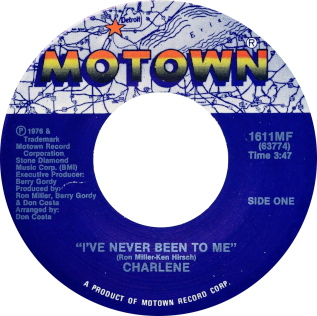
"I've Never Been to Me" is a ballad, written and composed by Ron Miller and Kenneth Hirsch and made popular via a recording by American singer Charlene. Although its original release in 1977 barely registered on the Billboard Hot 100, its re-release in 1982 hit #3 in the US and earned her a gold certification in Australia, where it held the #1 spot for six weeks. In addition, the song topped the charts in Canada, Ireland and the United Kingdom. It was also a top ten triumph in Norway, Belgium, New Zealand and the Netherlands and became Motown's first top ten hit by a white female solo singer.
"Why" is a hit song recorded by Frankie Avalon in 1959. It reached No. 1 on the U.S. Billboard Hot 100 chart published on the week of December 28, 1959. It was Avalon's second and final No. 1 hit.
"Young Love" is a popular song, written by Ric Cartey and Carole Joyner, and published in 1956. The original version was recorded by Ric Cartey with the Jiva-Tones on November 24, 1956. Joyner was a high school student when she co-wrote the song with Cartey, her boyfriend at the time. It was released in 1956 by Stars Records as catalog number 539 and one month later by RCA Records as catalog number 47-6751. Cartey's version never charted.
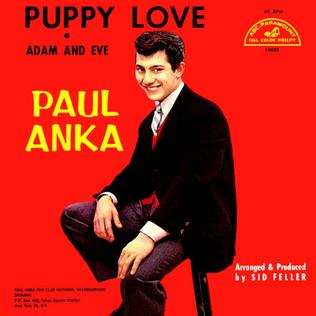
"Puppy Love" is a popular song written by Paul Anka in 1960 for Annette Funicello, a Mouseketeer, whom he had a crush on. Anka's version reached No. 2 on the Billboard Hot 100 behind Percy Faith's "Theme from A Summer Place", No. 4 on the Canadian CHUM Charts, and No. 33 on the UK Singles Chart.

"The Twelfth of Never" is a popular song written in 1956 and first recorded by Johnny Mathis the following year. The title is a popular expression, which is used as the date of a future occurrence that will never come to pass. In the case of the song, "the 12th of Never" is given as the date on which the singer will stop loving his beloved, thus indicating that he will always love him or her.
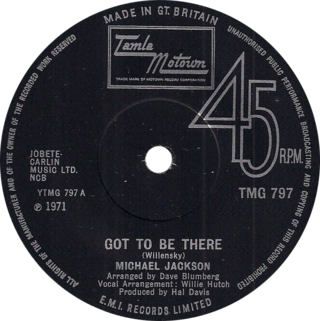
"Got to Be There" is the debut solo single by the American singer Michael Jackson, written by Elliot Willensky and released as a single on October 7, 1971, on Motown Records. The song was produced by Hal Davis and recorded at Motown's Hitsville West studios in Hollywood.

"Go Away Little Girl" is a popular song written by Gerry Goffin and Carole King. It was first recorded by Bobby Vee for Liberty Records on March 28, 1962. The lyrics consist of a young man asking a young attractive woman to stay away from him, so that he will not be tempted to betray his steady girlfriend by kissing her. The song is notable for making the American Top 20 three times: for Steve Lawrence in 1963, for The Happenings in 1966, and for Donny Osmond in 1971. It is also the first song, and one of only nine, to reach US number 1 by two different artists. Also notable in each of the solo versions is the similar double-tracked treatment of the singer's voice.
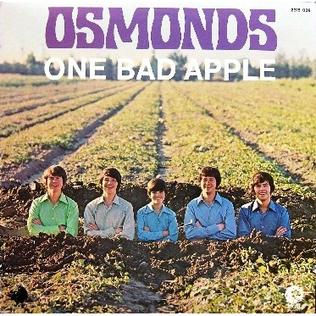
"One Bad Apple" is a song by the Osmonds, released as a single on November 14, 1970. It debuted on the Billboard Hot 100 on January 2, 1971. It hit the top of the chart on February 13, 1971 and stayed there for five weeks. It also reached No. 6 on the R&B chart. Billboard ranked it as the No. 4 song for 1971. The song is an early example of bubblegum dance. Both "One Bad Apple" and the Donny Osmond-credited single "Sweet and Innocent" are on the 1970 album Osmonds. It was certified Gold by the RIAA on February 4, 1971.
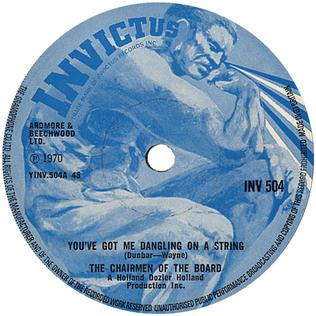
"(You've Got Me) Dangling on a String" is a 1970 soul music song by the Chairmen of the Board. The single reached No. 38 on the US Billboard Hot 100, No. 19 on the US Billboard R&B chart, and No. 5 on the UK Singles Chart. Ronald Dunbar and Edythe Wayne wrote the song.

"I'm Leaving It Up to You" is a song written by and originally performed by Don Harris and Dewey Terry in 1957. It was later popularized in 1963 by the American duo Dale and Grace, who took it to #1 on the Billboard Hot 100 chart. In 1974, Donny and Marie Osmond reached the top five on the US Hot 100 chart and peaked at #1 on the Billboard Hot Adult Contemporary chart with their cover.
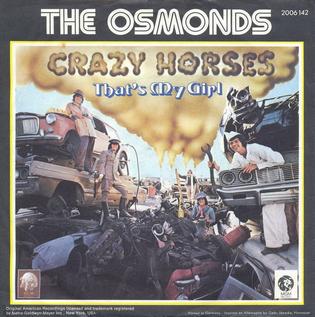
"Crazy Horses" is a song by the Osmonds, the title track from the album of the same name. It was released as the album's second single and reached number 14 on the US Billboard Hot 100 and number 2 on the UK Singles Chart. The song is the only hit record from the Osmonds to feature Jay Osmond as lead vocalist. It has since been covered by numerous other performers.
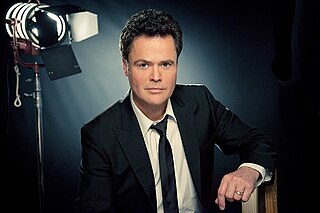
The discography of American pop singer Donny Osmond contains 18 studio albums, nine compilation albums, one live album, four video albums, three extended plays, four music videos, 25 singles and eight additional appearances. After several years collaborating with his siblings' band, The Osmonds, he embarked on a solo career in 1971. His debut single, "Sweet and Innocent," reached number seven on the Billboard Hot 100 and made him a teen pop star. Its follow-up entitled "Go Away Little Girl" topped the same chart in 1971. Also in 1971 his debut studio album was released called The Donny Osmond Album. It peaked at number 13 on the Billboard 200 all-genre chart. His third studio release, Portrait of Donny, reached number six on the Billboard 200 and is his highest-charting album to date. Its two singles became top ten hits on the pop chart: "Hey Girl" and "Puppy Love." He released his fourth studio effort in 1972, Too Young. The record peaked at number 11 on the Billboard 200. It spawned the top 20 pop hits: the title track and "Why." In 1973, Alone Together marked his fifth studio album release and peaked at number 26 in the United States. It spawned his cover of "The Twelfth of Never," which reached number eight on the Hot 100. By the mid-1970s, Osmond reached adulthood and his career began to decline despite collaborations with his sister, Marie Osmond. In 1976, he recorded an album of disco, which only reached number 145 on the Billboard 200.

"Morning Side of the Mountain" is a song written by Larry Stock and Dick Manning and first recorded in 1951 by Tommy Edwards. It settled at #24 on the pop chart. Edwards re-recorded it in 1959, reaching #27 on the Billboard Hot 100. The re-release was featured as the B-side of Edwards' other hit, a cover of Johnnie Ray's 1952 success, "Please Mr. Sun."

















